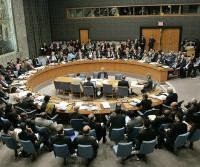After months of aggressive debates over the Middle East, the U.N. Security Council is starting to calm down. Last week the council released a statement supporting Kofi Annan’s peace plan for Syria -- which calls for a U.N.-supervised cease-fire and an “inclusive Syrian-led political process” -- signaling the change of mood. The Western powers reached consensus with Russia and China on the text, toning down and cutting controversial passages, after Moscow called for daily cease-fires to let humanitarian aid reach suffering Syrians.
The contrast with the mood at the United Nations in February, when the Chinese and Russians vetoed a resolution effectively calling for a change of leadership in Damascus, is startling. American, Arab and European officials responded to that veto with vitriol. “To block this resolution is to bear responsibility for the horrors that are occurring on the ground in Syria,” declared U.S. Secretary of State Hillary Clinton. Foreign policy experts were equally unimpressed by the February veto. Marc Lynch captured the mood, arguing that the vetoes signaled “the end of the U.N. option,” thereby damaging the institution.
At the time, it seemed hard to disagree. But nearly two months later, the U.N. remains central to diplomatic efforts to halt Syria’s war.

